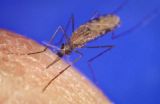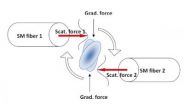(Press-News.org) More than a million people die each year of malaria caused by different strains of the Plasmodium parasite transmitted by the Anopheles mosquito. The medical world has yet to find an effective vaccine against the deadly parasite, which mainly affects pregnant women and children under the age of five. By figuring out how the most dangerous strain evades the watchful eye of the immune system, researchers from the Hebrew University of Jerusalem have now paved the way for the development of new approaches to cure this acute infection.
Upon entering the bloodstream, the Plasmodium parasite reproduces in the red blood cells and transports its proteins to their surface. These cells become sticky and cling to the walls of blood vessels, blocking them and damaging the human body. The immune system typically identifies these proteins as foreign and creates antibodies to fight the disease.
The deadliest of the five Plasmodium strains is Plasmodium falciparum, which causes more than 90% of deaths associated with malaria. This sophisticated strain deceives the immune system by revealing only one protein encoded by one of the sixty genes at its disposal. While the immune system is busy fighting that protein, the parasite switches to another protein not recognized by the immune system, thus avoiding the antibody response and re-establishing infection.
In research conducted at the Department of Microbiology and Molecular Genetics at the Institute for Medical Research Israel-Canada, and the Kuvin Center for the Study of Infectious and Tropical Diseases at the Hebrew University-Hadassah Medical School, Dr. Ron Dzikowski and research student Inbar Avraham revealed for the first time the genetic mechanism that enables a parasite to selectively express one protein while hiding other proteins from the immune system.
By combining bioinformatic and genetic methods, the researchers identified a unique DNA sequence found in the regulatory regions of the gene family that encode for these surface proteins. They showed that the parasite's ability to express only one gene while hiding the other 59 depends on this sequence. The research suggests that by interfering with the regulatory role of this DNA sequence it would be possible to prevent Plasmodium falciparum from hiding most of its destructive genes from the immune system.
According to Dr. Dzikowski, "These results are a major breakthrough in understanding the parasite's ability to cause damage. This understanding could lead to strategies for disrupting this ability and giving the immune system an opportunity to clear the infection and overcome the disease. This clever parasite knows how to switch masks to evade an immune attack, but our discovery could lead to new ways to prevent it from continuing this dangerous game."
INFORMATION:
The research, "Insulator-like pairing elements regulate silencing and mutually exclusive expression in the malaria parasite Plasmodium falciparum," was published this week in the Proceedings of the National Academy of Sciences. It was funded by the Israel Academy of Sciences and Humanities and the Einstein Kaye Fellowships, which supports outstanding research students.
Malaria parasite's masquerade ball could be coming to an end
Hebrew University researchers discover how the deadly malaria parasite evades the immune system, and make significant progress toward developing a cure
2012-12-03
ELSE PRESS RELEASES FROM THIS DATE:
BU, VA study describes 68 CTE cases in veterans, high school, college and pro athletes
2012-12-03
(BOSTON) – A study done by investigators at the Boston University Center for the Study of Traumatic Encephalopathy (CSTE) and the Veterans Affairs Boston Healthcare System, in collaboration with the Sports Legacy Institute (SLI), describes 68 cases of chronic traumatic encephalopathy (CTE) among deceased athletes and military veterans whose brain and spinal cords were donated to the VA CSTE Brain Bank. Of the 68 cases, 34 were former professional football players, nine had played only college football, and six had played only high school football. The results, which will ...
New York's Medical Schools urge Congress to preserve NIH funding for scientific research
2012-12-03
The Associated Medical Schools of New York (AMSNY) today directed a letter to the New York State Congressional
Delegation calling on them to reject a nearly 10-percent cut to the National Institutes of Health (NIH), Medicare and
Title VII health professions programs, that will take effect January 2, 2013.
"In order to meet the health challenges of an aging and increasingly diverse population, continue to foster the types
of innovation that will drive our regional economy, and remain a vibrant force in the global economy, we need to
invest more in medical research ...
World's smallest wrench puts a new twist on microscopic manipulation
2012-12-03
Harnessing laser light's ability to gently push and pull microscopic particles, researchers have created the fiber-optic equivalent of the world's smallest wrench. This virtual tool can precisely twist and turn the tiniest of particles, from living cells and DNA to microscopic motors and dynamos used in biological and physical research.
This new twist on controlling the incredibly small, developed by physicists at The University of Texas at Arlington, will give scientists the ability to skillfully manipulate single cells for cancer research, twist and untwist individual ...
Male chimpanzees choose their allies carefully
2012-12-03
The ability of male chimpanzees to form coalitions with one another in order to direct aggression at other male chimpanzees has certain benefits. A new study by Ian Gilby at Duke University in North Carolina and his colleagues has further revealed that it may not just be the coalition that is important, but who the coalition is with that determines future success. Their study finds that male chimpanzees with central positions in the coalitionary network were most likely to father offspring and increase in rank. Specifically, those who formed coalitions with males who did ...
Research explores markers of depression from childhood to adulthood
2012-12-03
Although several studies have followed the course of depression throughout the lifespan, the characteristics of depression at different developmental stages haven't been clearly identified. New research published in Clinical Psychological Science, a journal of the Association for Psychological Science, presents a unique longitudinal investigation of depression across four critical developmental periods from childhood to adulthood.
To better understand the developmental course of Major Depressive Disorder (MDD), Paul Rohde of the Oregon Research Institute and colleagues ...
Experts urge rapid evaluation for swallowing and voice problems after brain surgery
2012-12-03
Johns Hopkins experts are recommending early post-surgical assessment
-- preferably within 24 hours -- for trouble chewing and swallowing
food, or speaking normally, among patients who have had benign tumors
removed from the base of the brain.
Such early assessments, they say, may minimize complications
associated with the sometimes hazelnut-sized tumors, called
vestibular schwannomas. Damage can arise when the tumors themselves
press on the nearby cranial nerves -- key to controlling the tongue,
lips, mouth and throat -- or from the surgery itself.
Researchers ...
Leuven research opens new pathway for the treatment of Alzheimer's disease
2012-12-03
Scientists from VIB and KU Leuven have discovered a new target molecule for the development of a treatment against Alzheimer's disease. There is currently no cure for this disease. Many candidate drugs fail because they also target proteins essential to life. This discovery from Leuven could form a target for a treatment against Alzheimer's disease with fewer side effects and that suppresses the very first symptoms of the disease. This research will be published in the leading journal Nature Medicine.
Alzheimer's Disease
Alzheimer's Disease is the most common form of ...
Uncovering unique properties in a 2-dimensional crystal
2012-12-03
When the dry lubricant, molybdenum disulfide, is stripped down to a single layer of atoms, a tightly bound quasi-particle comprised of two electrons and a hole forms with unique spin and valley properties, researchers from Case Western Reserve University and colleagues discovered.
These charged quasi-particles, called negative trions, can be manipulated to change the light absorbed and emitted from this two-dimensional semi-conducting crystal, opening it to potential use in new solar cells and other electronic devices that are controlled by light or designed to control ...
Sharp spike in computer-related injuries predicted for medical workers, find studies
2012-12-03
ITHACA, N.Y. – As U.S. health care goes high tech, spurred by $20 billion in federal stimulus incentives, the widespread adoption of electronic medical records and related digital technologies is predicted to reduce errors and lower costs – but it is also likely to significantly boost musculoskeletal injuries among doctors and nurses, concludes a Cornell University ergonomics professor in two new papers.
The repetitive strain injuries, he said, will stem from poor office layouts and improper use of computer devices.
"Many hospitals are investing heavily in new technology ...
Cancer screening: The efficacy of mammography screening
2012-12-03
How effective is the German mammography screening program? This is the question examined by Oliver Heidinger of the Epidemiological Cancer Registry North Rhine–Westphalia and his co-authors in the first study on this subject in Germany, in Deutsches Ärzteblatt International (Dtsch Arztebl Int 2012; 109(46): 781-7).
To answer it, the authors have used the interval cancer rate as an indicator. Interval cancers are tumors found more or less by chance between two screenings. In approximately 880 000 women from North Rhine–Westphalia who had taken part in mammography screening ...
LAST 30 PRESS RELEASES:
Black soldier fly larvae show promise for safe organic waste removal
People with COPD commonly misuse medications
How periodontitis-linked bacteria accelerate osteoporosis-like bone loss through the gut
Understanding how cells take up and use isolated ‘powerhouses’ to restore energy function
Ten-point plan to deliver climate education unveiled by experts
Team led by UC San Diego researchers selected for prestigious global cancer prize
Study: Reported crop yield gains from breeding may be overstated
Stem cells from human baby teeth show promise for treating cerebral palsy
Chimps’ love for crystals could help us understand our own ancestors’ fascination with these stones
Vaginal estrogen therapy not linked to cancer recurrence in survivors of endometrial cancer
How estrogen helps protect women from high blood pressure
Breaking the efficiency barrier: Researchers propose multi-stage solar system to harness the full spectrum
A new name, a new beginning: Building a green energy future together
From algorithms to atoms: How artificial intelligence is accelerating the discovery of next-generation energy materials
Loneliness linked to fear of embarrassment: teen research
New MOH–NUS Fellowship launched to strengthen everyday ethics in Singapore’s healthcare sector
Sungkyunkwan University researchers develop next-generation transparent electrode without rare metal indium
What's going on inside quantum computers?: New method simplifies process tomography
This ancient plant-eater had a twisted jaw and sideways-facing teeth
Jackdaw chicks listen to adults to learn about predators
Toxic algal bloom has taken a heavy toll on mental health
Beyond silicon: SKKU team presents Indium Selenide roadmap for ultra-low-power AI and quantum computing
Sugar comforts newborn babies during painful procedures
Pollen exposure linked to poorer exam results taken at the end of secondary school
7 hours 18 mins may be optimal sleep length for avoiding type 2 diabetes precursor
Around 6 deaths a year linked to clubbing in the UK
Children’s development set back years by Covid lockdowns, study reveals
Four decades of data give unique insight into the Sun’s inner life
Urban trees can absorb more CO₂ than cars emit during summer
Fund for Science and Technology awards $15 million to Scripps Oceanography
[Press-News.org] Malaria parasite's masquerade ball could be coming to an endHebrew University researchers discover how the deadly malaria parasite evades the immune system, and make significant progress toward developing a cure

